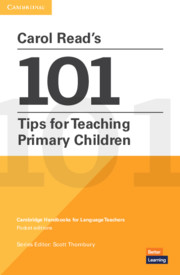Book contents
- Frontmatter
- Contents
- Acknowledgements
- Why I Wrote this Book
- A Getting Started
- B Core Skills
- C Classroom Management
- D Lesson Planning
- E Learning how to Learn
- F Storytelling
- G Playing Games
- H Values Education
- I Songs, Rhymes, Chants and Raps
- J Working with Projects
- K Intercultural Competence
- L Content-Based Learning (CLIL)
- M Thinking Skills
- N Vocabulary
- O Life Skills
- P Art, Craft and Design
- Q Mime and Drama
- R Inclusion and Diversity
- S Creativity
- T Adapting or Writing Materials
- U Listening and Speaking
- V Reading and Writing
- W Multiliteracies
- X Grammar
- Y Assessment
- Z The Last Word
- Glossary
- Selected Further Reading
- Index
Y - Assessment
Published online by Cambridge University Press: 28 October 2023
- Frontmatter
- Contents
- Acknowledgements
- Why I Wrote this Book
- A Getting Started
- B Core Skills
- C Classroom Management
- D Lesson Planning
- E Learning how to Learn
- F Storytelling
- G Playing Games
- H Values Education
- I Songs, Rhymes, Chants and Raps
- J Working with Projects
- K Intercultural Competence
- L Content-Based Learning (CLIL)
- M Thinking Skills
- N Vocabulary
- O Life Skills
- P Art, Craft and Design
- Q Mime and Drama
- R Inclusion and Diversity
- S Creativity
- T Adapting or Writing Materials
- U Listening and Speaking
- V Reading and Writing
- W Multiliteracies
- X Grammar
- Y Assessment
- Z The Last Word
- Glossary
- Selected Further Reading
- Index
Summary
Assessment involves using a range of different instruments in order to gather information and measure children's progress and performance over time. Some key questions are:
• Why assess? Assessment helps you to evaluate your teaching and take pedagogical decisions to make improvements. It also provides you with evidence to inform parents and children about their progress.
• When to assess? Assessment is an ongoing process. It includes everyday, formative assessment, summative assessment in the form of short assessment tasks or progress tests, and peer and self-assessment.
• Who assesses? As well as you, children play a role in peer and self-assessment and assessment for learning (AfL).
• How to assess? Assessment needs to be child-friendly and age-appropriate. It also needs to be ethical, accountable and support children's learning by providing a constructive and motivating experience. Assessment may include informal observation of children in class, end-of-unit and/ or end-of-term progress tests, portfolios and homework. With younger children, the emphasis is likely to be mainly, if not exclusively, on formative assessment during lessons. As children get older, assessment tends to include an increasing number of tests and, possibly, external exams.
• What to assess? This will be determined by language, content and skills that have been taught. It's also important to assess other factors such as children's participation and willingness to make an effort.
My key tips on assessment are:
97 Be wary of tests!
98 Integrate formative assessment
99 Give opportunities for peer and self-assessment
100 Involve children in assessment for learning (AfL)
97 Be wary of tests!
You should never rely on tests as the only means of assessing children's progress. You also need to be wary of the suitability of tests and the possible negative effect they may have.
Progress tests provide a snapshot of how children are performing at one particular moment in time. This has an important formative function in giving both you and them feedback on learning that has taken place (see 100). At the same time, tests can be stressful for children and, like everyone else, they have ‘off days’ which mean they may underperform. The test itself may also not be well-constructed or fit for purpose. For all these reasons, it's advisable that testing is just one of a range of instruments you use to gather evidence and information about children's progress over time.
- Type
- Chapter
- Information
- Carol Read’s 101 Tips for Teaching Primary Children , pp. 121 - 125Publisher: Cambridge University PressPrint publication year: 2020

